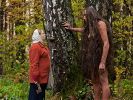Eye For Film >> Movies >> Celestial Wives Of The Meadow Mari (2013) Film Review
The Celestial Wives Of The Meadow Mari is a fascinating construction, a sort of folkoric gazetteer, anthropological, anthological, amazing. Alexey Fedorchenko's film, based on Denis Osokin's story, rooted deeply in the cultures and traditions of the Volga-Finnic people.
There are moments of shared colour, of ritual: blues, browns and greens; foods, flowers and dances. There is humour too, for all that there is sex and death and dancing and the ambulatory deceased and giants and an assemblage of women, all with names that start with 'O'.

There are Oshvika and Orazvi and Odacha and Ovda and Onalcha and Okalche and Ovrosi and Oshalge and Okanai and Oshanyak and Onya and Oropti and Osika and Ochina and Oshalyak and Oshtylech and Ormarche and Olika and Orika and Onashka and Osylay and Oshanyai and Otsvoen and Olya and on and on and that's not all.
There are curses, blue moose, blue combs, rowan brides and happiness-seeking coins, birch trees that must be appeased, the daughter of the wind, cubits measured on the belt of truth, VUVER the ravine devil, the spirit sorcerers of upper Vichmar, games of 'hoof'. There are leaf-whistles, dolls in soup, a horn of womanhood, Lynchian impresarios on bronze swans, moments that resemble more specialist movies, three suited suitors, love, marriage, sex, death, death, death, death. Oh, and laughter. Genuine comedy, moments of subtle amusement, outright guffaws, knowing winks, nudges. Traditional dress, ritual dinners, a cycle of apartments, allotments, revenant;, it just keeps adding stories as it goes.
It's easy to find yourself asking who are the dead and who are the living, but it unfolds across such a cycle of mystery and magic that it doesn't matter. There's a drive-by shooting from the back of a horse-drawn straw-cart, poetry readings in front of a shelf of science fiction hardbacks. All of it is so beautifully observed it is as waking from a childhood fever to demolish half a volume of Grimm before hallucinatory somnambulance washes once more over. The film draws highlights from a limited palette of colours, returns to a few basic themes like love, sex, marriage, death.
It's not without its problems. The episodic nature of it makes it a little overhwelming - some sequences could conceivably be shorter, others longer, but none really outstay their welcome. The subtitling is imperfect, and there's a bit of writing on a hillside that even Eye For Film's elite translation bureau couldn't quite decipher, but is probably "something peace", or "something world". Lackluster transcription on the part of your reviewer won't have helped. That said, if it was important enough to dedicate real estate to, it was probably worth translating, which is why we tried.
In fairness so much of the ritual and tradition is unexplained, perhaps inexplicable, and the rest of the film is more refreshing than a horn bowl full of hallucinogenic urine. It is a dream, a delight to be enjoyed as long as it lasts.
Reviewed on: 30 Jun 2013
















